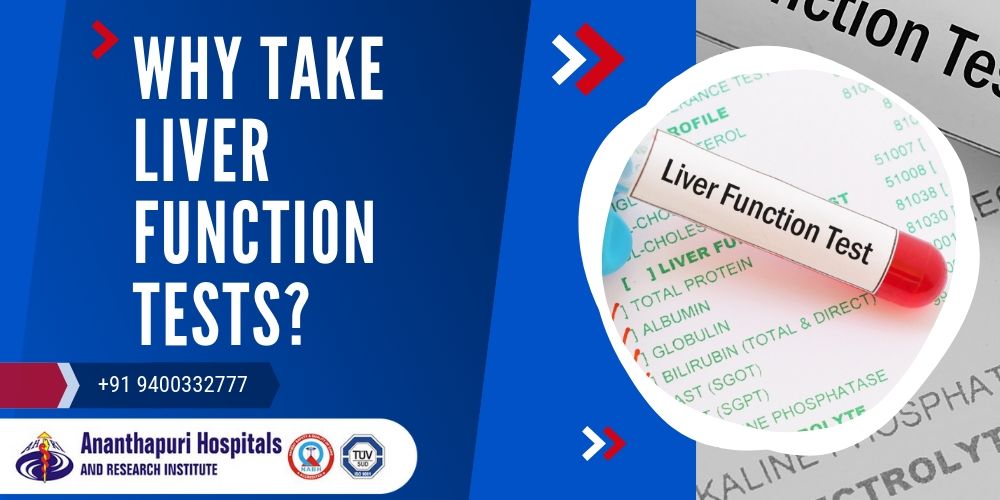- 03/July/2019

Why take Liver function tests? What are they? - Ananthapuri Hospitals
As per the World Health Organization, the liver disease affects every 1 in 5 Indians and is the 10th most common cause of death in India. The liver disease could be the next big battle our country needs to fight and therefore the need of the hour is AWARENESS OF EARLY DETECTION AND CONTROL!
Liver disease can be caused due to obesity, viral hepatitis, alcohol consumption and so on.
At an early stage, liver diseases need the most attention but unfortunately, do not show any symptoms. So how do you, at a basic level, know if your liver is healthy or not? Liver function tests!
Before we learn about what a liver function test is, let us understand the essential functions of a liver.
Essential functions of the liver
The liver is the largest internal organ and gland of our body. It takes charge of around 500 tasks. Amongst these tasks, its most important job is - filtering and passing blood coming from the digestive tract to the rest of the body. It helps excrete bile which is essential for fat digestion. The liver also makes proteins that are essential for blood clotting and other functions.
What are liver function tests?
Liver function tests are blood tests that determine the health status of your liver. They help diagnose and monitor liver diseases and damage. Most of these tests measure certain enzymes and proteins levels in your blood to understand
- How well the liver is carrying out its normal functions like albumin synthesis and bilirubin clearance
- How much enzymes the liver releases in response to a disease
Levels that are higher or lower than normal can indicate liver problems.
Why do I need to take liver function tests?
You need to take liver function tests:
- As a part of regular checkups, as it determines the overall health of your liver
- If you have the risk factors of liver disease, as it screens for any infections or damage in your liver
- If you have alcoholic or viral hepatitis, as it can monitor how far it has progressed and how well your treatment is working
- If you have liver cirrhosis, as it can determine how severe your disease is
How can my blood sample indicate liver diseases?
Your blood has enzymes and proteins in it. A higher or lower level of certain enzymes and proteins indicate liver problems. The following contents are most commonly tested for:
Liver enzyme tests
A higher than normal level of these enzymes may indicate liver damage or disease.
- Enzyme Alanine transaminase (ALT)
- Enzyme Aspartate transaminase (AST)
- Enzyme Alkaline phosphatase (ALP)
- Gamma-glutamyltransferase (GGT)
- L-lactate dehydrogenase (LDH)
Liver protein tests
- Albumin and total protein (responsible for fighting infections): Lower-than-normal levels of these might indicate liver damage or disease.
- Prothrombin time (PT): PT is the time your blood takes to clot. An increase in PT may indicate liver damage. But it can also happen if you're taking certain blood-thinning drugs such as warfarin.
Bilirubin tests
A higher than normal level of bilirubin may indicate jaundice, liver damage or disease.
How do I prepare for this test and what can I expect?
You may have to avoid eating food and having medicines eight hours before they take your blood sample because certain food and medicines can affect the results of your tests.
After your blood is drawn, it is sent to a laboratory for analysis. If the analysis is done in the same lab you can get your test results within a day. Whereas if it is taken to an off-site laboratory, you will receive your test results anywhere between 1 and 3 days.
If there is anything abnormal with your test results, the doctor may review your medications and your past medical history. If a certain medicine that you’re using is the cause for the increase in your liver enzymes, then the doctor may advise you to stop using it and prescribe appropriate alternatives.
If you consume too much alcohol, you will be advised to stop doing so for the well being of your liver.
If necessary, they may perform an ultrasound or CT scan and also recommend a liver biopsy for detailed analysis and confirmation of the diagnosis.
What does a normal result look like?
Normal blood test results for typical liver function tests look like this:
- ALT - 7 to 55 units per litre (U/L)
- AST - 8 to 48 U/L
- ALP - 45 to 115 U/L
- Albumin - 3.5 to 5.0 grams per deciliter (g/dL)
- Total protein - 6.3 to 7.9 g/dL
- Bilirubin - 0.1 to 1.2 milligrams per deciliter (mg/dL)
- GGT - 9 to 48 U/L
- LD - 122 to 222 U/L
- PT - 9.5 to 13.8 seconds
Normal results, however, vary from laboratory to laboratory and is slightly different for women and children. Your doctor will analyse these results to study your liver, diagnose your condition or determine the treatment you might need.
--------------------------
Ananthapuri Advanced Centre for Gastrointestinal and Liver Diseases is a referral centre for patients across India, The Gulf and Maldives. The centre has state of the art facilities for the early detection, diagnosis and treatment of complex gastrointestinal, liver and pancreatic diseases. We also have speciality liver clinics for diagnosis and treatment of all liver disease including cirrhosis liver, hepatitis B and C.
To book an appointment, call us at +91 9400332777 or visit our hospital at Chacka, NH Bypass, Thiruvananthapuram.

